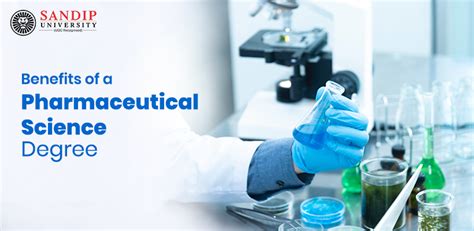The pharmaceutical industry, valued at a staggering $1.27 trillion in 2021, is projected to reach $2.4 trillion by 2028. Healthcare systems worldwide rely on the development and manufacturing of innovative pharmaceuticals to diagnose, treat, and cure diseases. A degree in pharmaceutical science equips graduates with the knowledge and skills to contribute to this vital sector.

Why Pursue a Degree in Pharmaceutical Science?
1. High Demand for Skilled Professionals:
With the rising prevalence of chronic diseases and the continuous advancement of medical technologies, the demand for qualified pharmaceutical scientists is surging. According to the U.S. Bureau of Labor Statistics, employment of pharmaceutical researchers is projected to grow 12% from 2021 to 2031.
2. Lucrative Career Prospects:
Pharmaceutical scientists enjoy competitive salaries. The median annual wage for pharmaceutical researchers was $120,680 in 2021, far exceeding the median wage for all occupations.
3. Impactful Work:
Pharmaceutical science plays a crucial role in improving public health. Graduates in this field contribute to the discovery and development of life-saving treatments that alleviate suffering and extend lifespans.
Curriculum and Specializations
Core Courses:
* Pharmaceutical Chemistry
* Medicinal Chemistry
* Pharmacology
* Pharmaceutics
* Regulatory Affairs
Specializations:
Pharmaceutical science programs often offer specializations, including:
* Drug Discovery and Development
* Pharmaceutical Analysis
* Clinical Research
* Regulatory Science
Career Opportunities
1. Pharmaceutical Research and Development:
* Develop new drugs and treatments
* Conduct clinical trials to evaluate drug efficacy and safety
2. Drug Quality Control and Assurance:
* Ensure the purity, potency, and safety of pharmaceutical products
3. Regulatory Affairs:
* Manage the regulatory approval process for new drugs and devices
4. Sales and Marketing:
* Market and promote pharmaceutical products to healthcare professionals
5. Patent Law:
* Protect intellectual property in the pharmaceutical industry
Strategies for Success
1. Strong Foundation in Chemistry and Biology:
Excel in chemistry and biology courses, as they form the backbone of pharmaceutical science.
2. Research Experience:
Seek opportunities to participate in research projects. Hands-on experience is invaluable for developing practical skills and networking with professionals.
3. Join Professional Organizations:
Become a member of professional organizations, such as the American Association of Pharmaceutical Scientists (AAPS). Attend industry conferences and events to connect with potential employers.
4. Stay Updated on Advancements:
Pharmaceutical science is a rapidly evolving field. Continuously update your knowledge by reading scientific journals, attending seminars, and pursuing continuing education opportunities.
Value-Added Skills
1. Data Analysis:
Master data analysis techniques to interpret clinical trial results, identify drug interactions, and optimize drug delivery systems.
2. Communication Skills:
Develop excellent communication skills to effectively convey complex scientific information to colleagues, regulatory agencies, and patients.
3. Leadership:
Foster leadership qualities to guide research teams and make informed decisions in a collaborative environment.
Conclusion
A degree in pharmaceutical science opens doors to a fulfilling and lucrative career in a dynamic and growing industry. Graduates contribute to the advancement of healthcare by discovering, developing, and ensuring the safety and efficacy of pharmaceutical products. By embracing value-added skills, pursuing research experience, and maintaining a passion for scientific innovation, aspiring pharmaceutical scientists can unlock their full potential and make a meaningful impact on the health and well-being of society.
Tables
Table 1: Top-Ranked Pharmaceutical Science Programs in the United States
| University | Program | Ranking |
|---|---|---|
| University of California, San Francisco | Pharmaceutical Sciences | 1 |
| University of Michigan | Pharmaceutical Sciences | 2 |
| University of North Carolina | Pharmacy | 3 |
| University of Texas | Pharmacy | 4 |
| Purdue University | Pharmacy | 5 |
Table 2: Median Annual Wage for Pharmaceutical Researchers by Industry
| Industry | Median Annual Wage |
|---|---|
| Pharmaceutical Manufacturing | $120,680 |
| Scientific Research and Development Services | $113,940 |
| Hospitals | $106,210 |
| Colleges and Universities | $97,560 |
Table 3: Projected Employment Growth for Pharmaceutical Researchers
| Region | Projected Growth Rate (2021-2031) |
|---|---|
| United States | 12% |
| Europe | 10% |
| Asia-Pacific | 14% |
Table 4: Commonly Used Analytical Techniques in Pharmaceutical Science
| Technique | Description |
|---|---|
| Chromatography | Separates and identifies compounds based on their movement through a stationary phase |
| Spectrophotometry | Measures the interaction of light with molecules to determine their concentration and structure |
| Mass Spectrometry | Identifies and characterizes molecules based on their mass-to-charge ratio |
